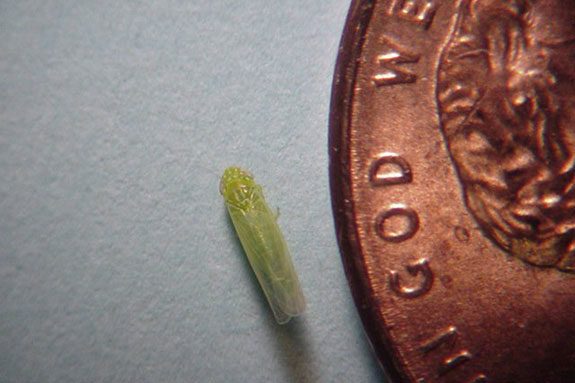"I received a report yesterday that potato leafhoppers have reached densities of 1.0 per sweep in some stands of alfalfa measuring four to seven inches located in southwestern Illinois near Greenville in Bond County," Gray said.
"When alfalfa is six to 12 inches in height, a density of 1.0 leafhopper per sweep has the potential to cause economic losses."
The value of the hay per ton, the height of the alfalfa and the cost of the insecticide application per acre must be factored into the decision to treat an infestation, Gray said.
For example, the economic threshold for potato leafhoppers would be 0.5 per sweep for alfalfa four to eight inches in height, with hay valued at $120 per ton and an insecticide application cost of $12 per acre.
If the value of hay is reduced to $60 per ton, and the insecticide treatment cost remains the same, the economic threshold increases to 1.0 per sweep.
"The use of a standard 15-inch sweep net is key to effectively scout and manage potato leafhoppers in alfalfa," he said.
Adult potato leafhoppers are 1/8-inch long, pale green, wedge-shaped and equipped with needle-like mouthparts that they use to suck fluids from plants and inject their saliva.
As a result of their feeding activity, the distribution of nutrients within the plant is disrupted. V-shaped yellowish areas may begin to appear on the tips of leaves and is often referred to as "hopper burn," he said.
"This discoloration may be misdiagnosed as a disease or nutrient deficiency, most notably boron," Gray said. "A deficiency of boron in plants is most often confined to younger leaves."
Large densities of potato leafhoppers can result in protein and vitamin A reductions in alfalfa and lower the nutritional value of this product for livestock.
Three to four generations of potato leafhoppers per year typically occur in Illinois. Above average temperatures throughout the season, accompanied by dry conditions, may lead to increased feeding and damage.
For additional information about the biology, life cycle, and management of this insect pest, refer to the following website: http://ipm.illinois.edu/fieldcrops/insects/potato_leafhopper/index.html FG
—Excerpts from ACES news release
Jennifer Shike
Media Communications Specialist
University of Illinois
jshike@illinois.edu
PHOTO
TOP: Photo by Matt Montgomery, University of Illinois Extension.










